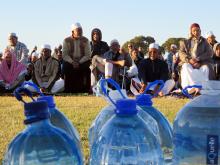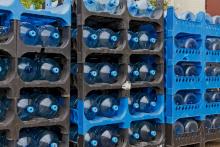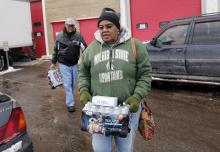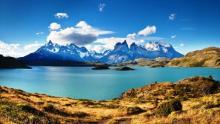Water

AS WE NEAR the second anniversary of the Oct. 7 Hamas attack on Israel, we don’t forget the hundreds killed that day. Neither do we dare look away from the cascade of human rights abuses Israel has unleashed upon the Palestinian people since. As Mae Elise Cannon and Ben Norquist report, this ongoing war has even turned water into a weapon — and the people of Gaza are dying of thirst.
The late theologian and longtime Sojourners contributor Walter Brueggemann would remind us that we have alternatives. A poll in July showed that 74% of Israelis back an agreement with Hamas that would release all hostages at once in exchange for an end to the war on Gaza. In May, 600 Israelis led an anti-war protest along Israel’s border with Gaza. In the U.S., college students have led the largest anti-war demonstrations seen in years, despite a targeted smear campaign to label pro-Palestinian groups as “terrorist support networks.” We can be conscientious objectors to war profiteering and join with Palestinian American memoirist Sarah Aziza in conspiring against the forces of destruction and erasure to relentlessly pursue life.

Dome of the rock
dome of the belly
every diaphragm
its own firmament
waters above
from waters below
eyeglasses flecked with salt spots
remnants of our oceans

Government officials have provided scant details for Day Zero logistics. Rather than communicate a clear plan of action, some are invoking fear with comparisons to World War II and 9/11.

Perhaps climate change’s calamities will galvanize the international political scene, cracking the iron grip of the wealthy on our politics and forcing redistribution of resources. But no matter what happens, people of faith must lead the charge in envisioning a just world for all inhabitants. To slow the destruction of the earth, a fundamental reimagining of our societies is required.

Each of us has one hundred times as many water molecules in our bodies than the sum of all other molecules combined. Today is World Water Day, a good day to reflect on how this symbol that blesses, sanctifies, and purifies in our rituals, but too often, does not do the same in daily life.

How are a poisoned water supply in Flint and water shut-offs in Detroit connected? Tommy Airey, co-editor of RadicalDiscipleship.net, talked with Detroit activists Monica Lewis-Patrick and Cecily McClellan to get the story behind the story.
LONG BEFORE water shut-offs and poisoning in Flint, democracy in much of Michigan had been hijacked. By the time a governor-appointed “emergency manager” was foisted on Detroit in spring 2013, every large black-majority city in Michigan—from Flint to Benton Harbor to Highland Park to Saginaw—had been appointed an EM, stripping all powers from elected leadership while possessing the authority to renegotiate or cancel union contracts, hire and fire government employees, and sell, lease, or privatize local assets.
Two years ago, about the same time that Flint’s EM transferred the city’s water source from Detroit’s water system to the highly toxic Flint River, Detroit’s EM ordered the city water and sewerage department to begin shutting off the water of all Detroiters who were two months or more behind on their water bills.
Today, in a city with 40 percent of its population surviving below the poverty line, Detroit water rates are twice the national average, and an estimated 100,000 residents, including many elderly folks and children, have had their water shut off by the city. The measures are forcing many longtime, low-income residents, the majority of them black, to leave the city.
Since 2008, the grassroots organization We the People of Detroit (WPD), led by five African-American women, has been creatively resisting emergency management—first of the school system and then the entire city—with a steady campaign of awareness-raising, canvassing, water delivery and advocacy for shut-off victims, and a comprehensive mapping project soon to be released.
Monica Lewis-Patrick is the charismatic, energetic point guard of the group, fueled by the Holy Ghost and her morning standard: a cup of coffee sweetened with four sugar packets. Lewis-Patrick, who’s a grandmother and the mother of two teenage daughters, lost her bid for city council two years ago by a few hundred votes. A few weeks later, she lost her only son to gun violence.
Cecily McClellan, the quiet, confident, all-business power forward of Team WPD, is a retired city employee and former vice-president of the Association of Professional and Technical Employees.
I spoke with them at WPD headquarters on the third floor of St. Peter’s Episcopal Church—a stone’s throw from a downtown getting a corporate facelift financed by public bonds, subsidies, and tax abatements to draw companies in from the suburbs, while many residents struggle just to survive and keep their homes. —Tommy Airey
Tommy Airey: Let’s get this straight: Are you advocating for free water for low-income Detroiters?
Monica Lewis-Patrick: Free water has never been the ask. Personally, I’m not opposed to free water. I believe that water is a human right, and that everyone should have access to it. But the ask here in Detroit has always been for affordable water.
What are the mayor’s objections to an affordability plan in Detroit?
Lewis-Patrick: Over the last 11 months, water shut-offs have led to more foreclosures and pushing people out of the city. We believe [city officials] do not want to participate in a water-affordability plan because it would allow more people to stay in the city, especially in communities they want cleared out for future development.
Is this a conspiracy?
Lewis-Patrick: Conspiracy, in my mind, isn’t the appropriate term, because a lot of times people marginalize conspiracy as just somebody’s idea or accusation. What I would say is that it has been a collaborative, well-orchestrated system of evil. We know for a fact, through all the political analysis and economic research that has been done, that the city bankruptcy didn’t have to go down. People saw it as an opportunity to be able to divest from the water department, to weaken the water department intentionally.
Flint was actually advised by the governor and his emergency managers to come off of the Detroit Water and Sewerage Department system and then to become a part of another water system called KWA [Karegnondi Water Authority]. Flint was the largest external customer of the Detroit water system. How is it that you are advising us to become financially solvent, while at the same time all your deeds are making us insolvent?

Washington, DC - Speaking this morning on MSNBC’s “Morning Joe” program, Reverend Jim Wallis addressed the current crisis in Flint, MI by saying “Race is in the air we breathe and in the water we drink in Flint … I don’t think if it was 8000 white kids this would’ve happened."
Rev. Wallis was in New York to discuss his latest book, released this week, America’s Original Sin: Racism, White Privilege, and the Bridge to a New America (Brazos Press).
“If white Christians acted more Christian than white, black parents would have less to fear for their children,” says Rev. Wallis in the book.
Rev. Wallis, an evangelical, also addressed the GOP primary this week, saying on CNN’s “Newsroom” (segment begins 9:28:43) that “When he is deliberately fueling racial fear and hatred, Donald Trump is poisoning and polluting the American political landscape."
CNN polled Iowa GOP caucus-goers after the 2012 election and found that 60% identified as evangelical

Catholic Charities is giving out water and food. The Flint Jewish Federation is collecting water and water filters. And the Michigan Muslim Community Council has distributed more than 120,000 bottles of clean water for Flint, Mich. But these faith organizations are also focused on a longer-term goal: to make sure the impoverished city, where President Obama last weekend declared a state of emergency over its poisoned water, is never so neglected again.

"The biggest open question in Paris may be how much aid goes to poor countries trying to leapfrog fossil fuels,” Bill McKibben, Schumann Distinguished Scholar at Middlebury College and founder of 350.org, said.
“For reasons both moral and practical the number should be large — larger than it likely will be."
As we think about the future of our children and our grandchildren, we need to rethink our use of water: how we store it, how we carry it and how we drink it. Water is a human necessity. Our ignorance can lead to the irony of spoiling watersheds — by robbing them of potable water while introducing mountains of plastic waste, impervious to decays which produce useful soils, and diverting water from useful work.

One by one the stars come up over the Mekong,
and the Buddhist novices,
finished with the evening prayers,
rush out to the water in their orange robes,
and stand with their hands over their eyes,
as if the light were too much for them.
Their master tells them,
Boys, if you want to dream to the stars
you must ask the universe as you go to sleep.
In 2014, the Inter-American Development Bank (IDB) premiered Water Everlasting? The Battle to Secure Haiti’s Most Essential Resource, a documentary film addressing concerns about Haiti’s public water system.
Government agencies and charitable organizations have spent decades attempting to provide clean water to Haiti, but administrative weaknesses often impede these efforts. The 2010 earthquake exacerbated the problem. Suddenly, millions of people lacked access to safe drinking water, and waterborne diseases reached epic proportions.
Yet, despite the many instances of lack, there is good being done in Haiti in various capacities. Read “On a Firm Foundation” to learn of the many positive accomplishments of Haitians working in their own neighborhoods.

EXECUTE: TO ENACT OR DO. Having grown up in inner-city Chicago, I have fond memories of red fire hydrants, swinging jump ropes, and church robes. During summer, the fire department would open the hydrants. Parents granted the petitions of children to run through the streams of water, soaking our clothes and cooling our backs. And while I never achieved the rhythmic agility to jump Double Dutch, I loved to recite the rhymes, which eventually helped me gain a verbal dexterity like that of my pastor. I wanted one day to have a robe like hers—one that signaled that the words I spoke revealed the reign of God.
Turn the clock back. Some children would hold very different memories of fire hydrants, ropes, and robes. In Birmingham, Ala., in1963, the force of the water injured petitioners for freedom. During the American Revolution, a Virginia justice of the peace named Charles Lynch ordered extralegal punishment for Loyalists to the Crown. The swinging rope became the tool of mob violence. And the “hooded ones” continue to use the label of “Christian” to make a mockery of the vestments of clergy.
Fire hydrants. Ropes. Robes. Execute: to eliminate or kill. Meaning conveyed to the hearer may not at all resemble the intention of the speaker. Often communication requires suspension of what we think in order to listen to the context from which the speaker shares. Reading is no easier a task. Sometimes the same letters forming the same word present entirely different meanings. Justice executed. What does it mean?
The context for the next four weeks exposes what the Lord’s justice requires.
CHRISTMAS, ON THE surface, looks like the most wonderful time of year—the season of love, lights, carols, candles, and family reunions, the time when Christians celebrate the birth of Jesus Christ. Look a bit deeper, though, and one might notice a more idolatrous narrative shining just as brightly: consumerism.
From Black Friday to New Year’s Day, we are inundated with the commercial demands of Christmas. For many, the list of things to do and gifts to purchase can seem endless. We buy into the mantra that the more money we spend, the more love we convey. We become lost in crowded stores, endless websites, and credit card debt. Christians often struggle to faithfully observe Advent, a time of waiting and preparation for the miraculous birth of Jesus.
While many of us purchase this spurious version of Christmas, a new movement has been born. It’s called Advent Conspiracy (AC), and its participants are seeking to turn Christmas upside down by exchanging consumption for compassion.
“Advent Conspiracy is not a four-point checklist on how to do Christmas. If anything, it’s a chance for us to rediscover the wonder and the mystery of the incarnation and what that means to us personally and what that might mean for the world,” said Greg Holder, lead pastor of The Crossing church in the St. Louis area.

Is access to clean water for public use a human right? According to Luis Infanti, the Roman Catholic bishop of Aysen in Chile, the answer is yes. This week marks the opening of Chile’s “First Cabildo for Water,” a meeting organized by the Coalition for the Defense of Water and Life, comprising civil society and religious groups.
People from all over Chile are attending and bringing water samples taken from lakes, streams, and rivers in their communities to be blessed by Bishop Infanti. “Water has often been captured, kidnapped and commodified,” said Infanti, according to Agenzia Fides, “but we know that it must give life and reach all our brothers and sisters, flow in abundance and not be anyone’s privilege.”

At an interfaith summer camp in northern New Jersey, two dozen children explored a swamp to learn how creatures depend on safe water.
In Southern California, a Unitarian Universalist congregation installed a dry well so water from its church rooftops drains into underground pipes to replenish the water table.
In Vermont, members of a Lutheran church removed cars and appliances that had been dumped in a nearby stream and restored its banks with local willows and oaks.
Across the country, water has become more than a ritual element used in Christian baptismal rites or in Jewish and Muslim cleansing ceremonies. It has become a focus for worshippers seeking to go beyond water’s ritual symbolism and think more deeply about their relationship to this life-giving resource.
IN FRANCE, about 70 percent of water services are privatized. French corporations continue to vie for control of the global water supply. But in 2010, Paris, in a case of “remunicipalization,” exited contracts with Paris-based Veolia and Suez Environnement, the world’s two largest water service companies.
Veolia is also the largest waste-water corporation in the world. Subsidiary Veolia Water North America is the largest private operator of U.S. municipal water and waste-water systems and controls the water service of about 14 million people.
The city of Jakarta, Indonesia, was recently confronted with a clean-water crisis as supplies run dry and a leaky system loses about 40 percent of its water. The city, with 10.9 million people, decided to buy back control of its water system in June from Suez Environnement.

"HOW DID THIS HAPPEN?" pondered the middle-aged woman as she panted up the road to her village of Sychar, water jar forgotten. “How did we get into this heavy theological conversation from a simple request for a drink of water? Sometimes conversations take sharp turns, but this is just too bizarre. I’ve known a number of men in my life, but only the crazy ones told me they were the messiah! Better check this out with the town elders.”
In contrast to the approximately 800 references to water in the Hebrew Bible, the New Testament is relatively spare. A friend explained the difference. The ancient Hebrews emerged from the eastern desert cultures of Egypt and Babylonia (now Iraq), which built their empires around rivers and where water was scarce and precious. But the New Testament writers were oriented toward the wetter West, where seafaring Greeks and Romans had appropriated the Mediterranean Sea as their major mode of transportation and conquest. For example, even though the book of Acts only mentions the word “water” in reference to baptism, the early missionary movement depended on travel by ship to spread the gospel message.
Water in the synoptic gospels
All four gospels introduce us to John the Baptist down by the Jordan River, who dunks in its flowing water those who repent from sin as a symbol of their cleansing. After John moves offstage, the synoptic gospels center much of Jesus’ activity in the towns around the Sea of Galilee. Here he not only teaches from a boat (Matthew 13:2; Luke 5:3), but he and his disciples travel in it from one side of the lake to the other, which includes a miraculous walk on and rebuking of the stormy waves (Matthew 14:22-27; Mark 6:47-52; Luke 8:22-25). Other references to water are few and sometimes incidental.